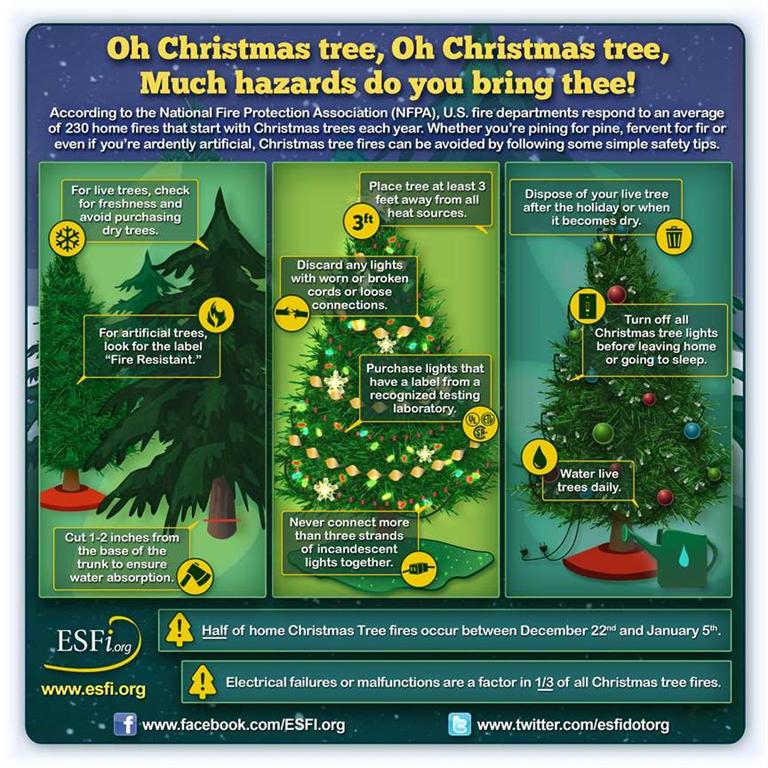For Immediate Release:
December 2, 2014
’Tis the season for fire safety, too
County fire marshal has timely reminders for all
FREEHOLD, NJ – The winter holidays are a time for family and friends to get together. Holiday décor that glitters and glows means that everyone should be careful with candles, holiday lights and Christmas trees, according to Monmouth County officials. 
“By keeping in mind some fire safety basics, residents can improve their safety and greatly reduce their chances of becoming a holiday fire statistic,” Freeholder John P. Curley said. “The top two things to remember are to exercise care and caution if you are using candles and make sure that you keep your Christmas tree watered.”
Recommendations for safe candle use are:
- Use flameless candles;
- If you are using traditional candles, make sure they are in stable holders and place them on a stable, level surface where they cannot be easily knocked over or down;
- Do not leave candles unattended and never leave the house with candles burning, and
- Never put lit candles on a tree.
- Never go near a Christmas tree with an open flame – candles, lighters or matches.
“Far too often we hear about families who are displaced, injured or killed during the holidays because of fire,” Fire Marshal Henry Stryker III. “These are tragedies that can be avoided by remembering some fire prevention basics.”
Some Christmas tree recommendations are:
· Keep the tree watered by keeping the tree stand filled with water at all times;
· When selecting a tree, be sure the needles are green and hard to pull back from the branches. The trunk should be sticky to the touch. Old trees can be identified by bouncing the tree trunk on the ground. If many needles fall off, the tree has been cut too long, has probably dried out, and is a fire hazard;
· If you are using a metallic or artificial Christmas tree, make sure it is flame retardant;
· Do not place your tree close to a heat source, including a fireplace or heat vent. The heat will dry out the tree, causing it to be more easily ignited by heat, flame or sparks. Do not put your live tree up too early or leave it up for longer than two weeks;
· Never put tree branches or needles in a fireplace or wood burning stove, and
· When the tree becomes dry, discard it promptly. The best way to dispose of your tree is by taking it to a recycling center or having it hauled away by a community pick-up service.
Stryker recommends that residents follow the holiday safety recommendations put forth by the U.S. Fire Administration (USFA) and National Fire Protection Association (NFPA).
The USFA estimates that more than 33 million American homes have natural Christmas trees. A burning tree can rapidly fill a room with fire and deadly gases.
To take care of your holiday lights and decorations:
- Inspect holiday lights each year for frayed wires, bare spots, gaps in the insulation, broken or cracked sockets, and excessive kinking or wear before putting them up. Use only lighting listed by an approved testing laboratory;
- Do not overload electrical outlets;
- Do not link more than three light strands, unless the directions indicate it is safe to do so; Connect strings of lights to an extension cord before plugging the cord into the outlet. Make sure to periodically check the wires – they should not be warm to the touch;
- Do not leave holiday lights on unattended;
- Use only nonflammable decorations. All decorations should be nonflammable or flame-retardant and placed away from heat vents, and
- Never put wrapping paper in a fireplace. It can result in a very large fire, throwing off dangerous sparks and embers and may result in a chimney fire.
According to the USFA, residential fires occurring during the holiday season cause more than $990 million in damage, claim the lives of more than 400 people and injure another 1,650 people.
Finally, as in every season, have working smoke alarms installed on every level of your home, test them monthly and keep them clean and equipped with fresh batteries at all times. Know when and how to call for help. And remember to practice your home escape plan.
“Water your tree!” Stryker stressed. “Typically, shorts in electrical lights or open flames from candles, lighters or matches start tree fires. Well-watered trees are not a problem; dry and neglected trees can be.”
# # #